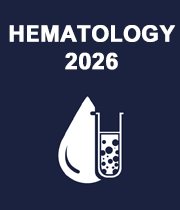Genetic Hematology
Genetic Blood Diseases, Genetic blood disorders are passed down from one generation to the next. Reduced red blood cell production causes a variety of blood diseases. Red blood cells in our bodies do not endure indefinitely and must be replaced after a period of time. When the generation of these red blood cells ceases, it causes blood abnormalities in humans and may result in serious sickness. Sickle cell anaemia and thalassemia are two disorders that are connected to defective haemoglobin. Genes on chromosomes can pass these disorders down from parents to offspring. When both parents carry the sickle cell trait, a kid has a 25% chance of developing sickle cell disease. The rapidly evolving field of genetic technology and its use in the management of haematological malignancies has resulted in considerable improvements in therapy and outcome. Most hematologic neoplasms now rely heavily on genetics for diagnosis and prognosis.



Title : Acute intermittent porphyria: A neurological dilemma obscured by ubiquitous fgastrointestinal presentation
Mayank Anand Singh, Mimer Medical College, India
Title : Comprehensive symptom management and supportive nursing care in a preterm toddler undergoing HSCT for pyruvate kinase deficiency
Tran Thi Dung, Vinmec International Hospital, Vietnam